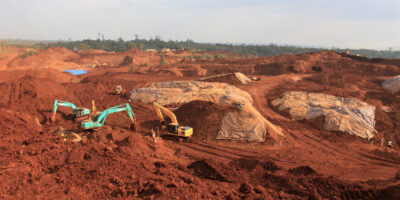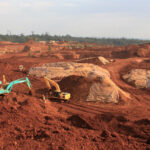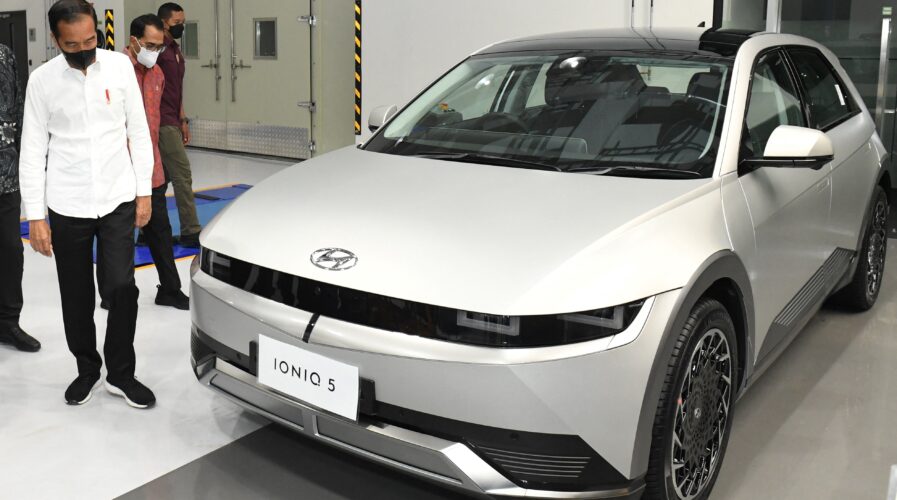
Hyundai launches a new plant to produce Indonesia’s first locally assembled EV. (Photo by Handout / PRESIDENTIAL PALACE / AFP)
Hyundai and Volvo to produce locally assembled EVs in Indonesia and Malaysia
- In Indonesia Hyundai factory will produce the firm’s newest EV model the Ioniq 5, with an annual capacity of 250,000 vehicles.
- Hyundai will also build a network of charging stations and a battery production plant in collaboration with South Korean electronics multinational LG.
- Meanwhile, Volvo plans to manufacture the Complete Knocked Down unit of EV at its manufacturing facility in Malaysia
Indonesia has a goal to achieve zero net emissions by 2060 and to achieve that, the country is targeting to produce two million electric vehicles (EVs) by 2025, both cars and motorcycles. To kickstart that, South Korea’s Hyundai Motor Group will be producing the country’s first locally assembled EV in its newly launched assembly plant, which is also Indonesia’s first.
The newly-built factory will produce the firm’s newest model the Ioniq 5, with an annual capacity of 250,000 vehicles. The company is also building a network of charging stations on top of a battery cell factory in nearby Karawang together with LG Energy Solutions, which is expected to be completed in the first half of next year before being operational in 2024.
Indonesia as it is, is the world’s largest nickel producer and also rich in cobalt, bauxite and copper ores–all of which are key materials in the manufacture of batteries for electric cars. Hence why President Joko Widodo has said his government is aiming to establish an integrated EV “ecosystem” ranging from metals mining to battery production and car assembly.
Speaking at the inauguration ceremony this week, in the industrial township Cikarang, east of the capital Jakarta, Widodo said, “I hope Hyundai’s IONIQ 5 will become an important milestone in the development of Indonesia’s EV ecosystem. Moving forward, EVs should be our main mode of transportation.”
The Indonesian government has also lifted import duties on EV parts to aid the development of the industry. “We have to be a key player in the global supply chain of the electric vehicle industry,“ Widodo added.
Hyundai has big plans for EV in Indonesia
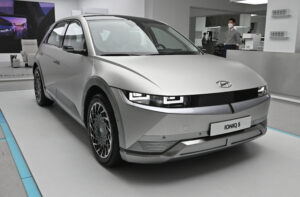
(Photo by Jung Yeon-je / AFP)
For Hyundai, Indonesia isn’t a new market. In fact, Hyundai is already a heavy hitter in the Indonesian EV segment, with the Ioniq Electric and Kona Electric accounting for 87.3% of all electric car sales in the country in 2021, reports claims. According to a particular report by the Korea Times, Hyundai has been seeking to expand its presence in Indonesia and other Southeast Asian countries–a move mainly to offset declining sales in China.
In short, South Korea’s leading carmaker is now setting its eyes on ASEAN countries centered on Indonesia to become its main markets in the region. Infact, Hyundai Motor’s Indonesian EV plant is the company’s first to be built in one of the ASEAN member countries.
As of September 2021, according to the ministry for maritime industry, transportation and defense equipment director Sony Sulaksono, Indonesia had only 150 electric four-wheelers, 5,538 two-wheelers and 29 three-wheelers on the road to date–a never far from the government’s target of 400,000 electric four-wheelers and 1.76 million two-wheelers by 2025.
For a while now Indonesia has been courting America’s Tesla and has explored deals with two of the world’s top producers of EV batteries — China’s Contemporary Amperex Technology (CATL) and South Korea’s LG Chem. Both the companies supply the batteries for Tesla’s made-in-China models.
CATL has in fact announced an investment of US$5.2 billion to build integrated battery plants in the country, while LG Chem has signed a memorandum of understanding on a US$9.8 billion investment to produce EV batteries domestically, according to Indonesia’s investment coordinating board.
Jakarta, although has not signed anything concrete with Tesla, has stayed in close touch with the firm’s chief executive Elon Musk in 2021. There were a handful of efforts made to charm Musk including by the country’s President Joko Widodo himself who has personally called Musk to discuss EVs and to consider Indonesia as a potential launch site for SpaceX, Musk’s aerospace manufacturing and space transport venture.
Musk said he would send a team from Tesla to survey investment opportunities but no dates have been fixed. Jakarta continued staying in touch with the company and after six video calls, Tesla sent an investment proposal in February 2021 to build a facility for an energy storage system (ESS) and lithium-ion battery plant in Indonesia, according to the country’s ministry for maritime and investment affairs.
While there were no much progress from Tesla yet, the country’s Minister of investment and head of the Indonesian Investment Coordinating Board (BKPM) Bahlil Lahadalia revealed in October last year hat he is also persuading Volkswagen to set up production of EV battery components in Indonesia, and that he made the proposal during a working visit to Germany.
Volvo’s EV plans in Malaysia
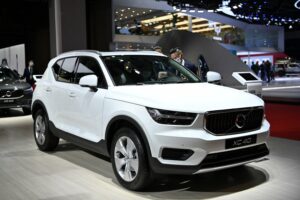
(Photo by Hector RETAMAL / AFP)
Over in Malaysia, Volvo plans to produce its first Complete Knocked Down (CKD) unit of EV at its manufacturing facility in Shah Alam, Selangor. Volvo Car Malaysia will be the first automotive brand in Malaysia that has a completed plug-in hybrid (PHEV) line for all car models.
Volvo will produce the XC40 Recharge Pure Electric model in its plant and plans to continue leading the early automobile electrification initiative by exporting the locally assembled model to the ASEAN market. Moving forward, Volvo plans to launch one new locally assembled EV model every year beginning from 2022. This is in line with the company’s plan for going into full electrification by year 2030.
“The XC40 Recharge Pure Electric is just one of our many steps to encourage consumers to adopt EVs for a more sustainable future. By mid-decade, Volvo aims to reduce its overall carbon dioxide (CO2) lifecycle emissions per car by 40 per cent. This means more than simply reducing tailpipe emissions – electrification is not enough. We must also reduce CO2 emissions across our operations and supply chain,” said Charles Frump, Managing Director of Volvo Car Malaysia.
Malaysia is the third largest automotive market in ASEAN, making the automotive industry a strategic perk of the country’s manufacturing sector. There are currently 28 manufacturing and assembly plants in Malaysia producing motor vehicles (passenger vehicles, commercial vehicles, motorcycles, and scooters); and automotive parts and components. The automotive ecosystem also encompasses research and design, product and process development, materials management, and after-sales services.
The production of the first locally assembled EV by Volvo will be the catalyst to advance the automotive industry in line with the National Automotive Policy 2020 and propel Malaysia to become a hub for EV in the ASEAN region.
READ MORE
- Strategies for Democratizing GenAI
- The criticality of endpoint management in cybersecurity and operations
- Ethical AI: The renewed importance of safeguarding data and customer privacy in Generative AI applications
- How Japan balances AI-driven opportunities with cybersecurity needs
- Deploying SASE: Benchmarking your approach

